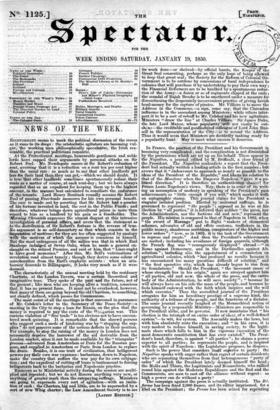NEWS OF THE WEEK.
ECCENTRICITY seems to mark the political discussion of the recess . as it runs to its dregs : the aristocratic agitators are becoming vul- gar, the working men philosophically speculative, the Irish rea- sonable, the practical politicians romantic. At the Protectionist meetings, honourable gentlemen and noble lords have capped their arguments by personal attacks on Sir Robert Peel. Mr. Newdegate sneers at Sir Robert's reduction of rent, averring that it is a reduction on a rent ten per cent higher than the usual rate : as much as to say that other landlords get less for their land than.they can get,—which we should doubt. It is true that other landlords sometimes spontaneously reduce their rents as a matter of course, at each rent-&.y ; but we have always regarded that as an expedient for keeping them up to the highest amount, in the manner best calculated to conciliate the endurance of the tenants. Lord Henry Bentinck roundly accuses Sir Robert Teel of passino. Free-trade measures for his own personal benefit. The case is made out by asserting that Sir Robert had a quarter i of his fortune invested in land, the rest in the Public Funds ; and therefore, whatever brings down agricultural prices is more than repaid to him as a landlord by his gain as a fundholder. The Morning Chronicle expresses the utmost disgust at this intrusive investigation of personal affairs, and avers that the statement as to the distribution of Sir Robert's fortune is the reverse of true. No argument is so self-damnatory as that which consists in the imputation of motives ; for they are too often suggested by analogy with the motives of which the accuser is conscious in himself. But the most outrageous of all the sallies was that in which Earl Stanhope indulged at Seven Oaks, when he made a general on- slaught on the retired Premier, and said at him, that " Liars ought to have good memories." After this, Mr. Bell's vaticinations of revolution read almost tamely ; though they derive some colour of corroboration from the Earl's emphatic accents : when an aris- tocracy descends to Billingsgate, it looks very much as if it were doomed.
The characteristic of the annual meeting held by the residuary Chartists, at the London Tavern, was a certain theoretical and imaginative tone. They spoke of the past and the future, not of the present; like men who are keeping alive a tradition, conscious that it has no present force. It must not be overlooked, however, that many of them are going beyond the old Chartism, to something, not clearly defined, which passes for Communism. The most outre of all the meetings is that convened in pursuance of Mr. Cobden's letter to the Secretary of the Peace Society—a meeting in the City to stop a loan for Russia, on the plea that the money is required to pay the costs of the 1:1=orian war. This curious violation of " free trade " is too obvious not to have encoun- tered much quizzing. It is remarkable that the shrewd persons who suggest such a mode of hindering war by " stopping the sup- plies ' do not perceive some of the serious defects in their position. For example, to stop the raising of the money in London does not necessarily deprive the borrower of the aid derivable froni the London market, since it can be made available by the " triangular " process—advanced from Amsterdam or Paris for the Russianpur- pose and supplied to Amsterdam or Paris from London to replace the drain. Besides, it is one trait of civilization, that belligerent powers pay their own war expenses : barbarians, down to Napoleon, make the country that suffers the war pay for its own subjuga- tion • and the expedient of cuttingoff loans is tantamount to forcing belligerents back to the barbarian and Napoleonic practice. Rumours as to Ministerial activity during the session are multi- plied and'repeated ; but we do not discern anything very new, or anything of greater mark than the ratepaying suffrage. Ministers are going to supersede every sort of agitation—with an imita- tion of each : the Charters, big and little, are to be superseded by a sort of new Whig charter; the Law Amendment Society is to see
its work done—or shelved—by official hands, the Keeper or the Great Seal consenting, perhaps as the only hope of being allowed to keep that great seal ; the Society for the Reform of Colonial Go- vernment is to be outdone by concessions of local independence to colonies that will purchase it by undertaking to pay their own way ; the Financial Reformers are to be baulked by a spontaneous reduc- tion of the Army—a dozen or so of regiments clipped at the ends ; the scandal of Rajah Brooke is to be smothered unCler a measure for discontinuing the desperately inconvenient practice of giving lavish head-money for the capture of pirates. Mr. Villiers is to move the Address in the Commons —a sign, some say, that the Clarendon influence is in the ascendant among Ministers ; while others inter- pret it to. be a sort of-rebuff to Mr. Cobden and his new agitations. -Miniaters " draw the line " at Charles Villiers. Sir_Iimes Duke, the late Lord Mayor, whose popularity 'Will not easily be out- shene—the creditable and goodnatnred colleigne'of Lord John Rus- sell in the representation of the City-His to second the Address. Thus it would seem that. Ministers are decidedly ranking ready for a popularity hunt. May it meet what success it deserves.


























